#what is essentially the only thing I know about his character with any certainty
Explore tagged Tumblr posts
Text
I’m so fucked about Sanemi at this point I don’t even know what’s canon what’s fanon and what came to me in a series of cryptic, prophetic dreams
#was their mother a seamstress? it would make sense if she needed to work and also stay home with her one billion children#but I’ve got it in my head that sanemi can /does sew (learned from her) and idk why#did I absorb that from a beloved mutual’s headcanon?#I’m adopting it because I like it#esp if he spent a lot of time around the women his mother sewed for I think that would contribute to#what is essentially the only thing I know about his character with any certainty#his being on that respect women juice#except in the ‘what the pillars think of each other’ think it says he doesn’t like mitsuri#so what is the truth king#whatever they don’t know him like I do he respects mitsuri because she’s strong#postcards from stupid town
2 notes
·
View notes
Text
Alright everyone, buckle up and sit down. I was talking with @nerdasaurus1200 on another post and came to the conclusion that I need to write Sera meta so let's freaking GO

I'm mostly gonna be talking about Sera, what we know about her so far, and what makes her tick (aka her fears) and why she's not a bitch/asshole the way apparently so many people like to portray her? (I've mostly just been hanging out with fan art and headcanons specifically about Lucifer in the fandom so I haven't seen these specifically, but someone approached me about how they liked m portrayal of Sera in my fic which was NOT that of an asshole and apparently multiple people are portraying her that way? Idk I haven't seen any but uh yeah let's talk SERA)
Characters are always the most important part of a story, and even if they're not a main character and/or the audience nor the writer know what they want/need, the writer at the very least needs to know How and Why a character makes decisions, instead of just "oh they're an asshole" So let's do that for Sera. Why is she making the decisions she's making? LETS GO
Let's start off by talking about what we know about Sera
She's at least as old as Lucifer, she was there for the creation of earth given the appearance of her silhouette in Charlie's exposition

We know that the exterminations might have been Adam's idea, but it was HER decision to approve them
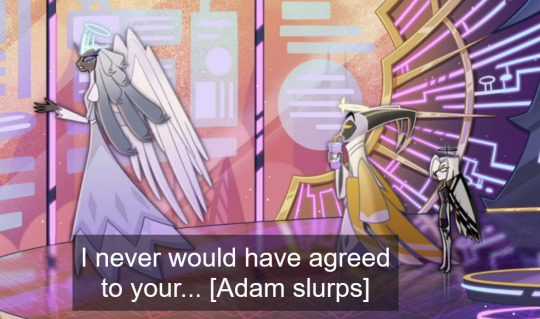
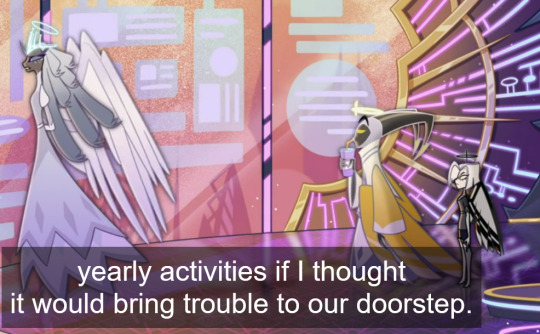
We know that she's FOR SURE older than Emily
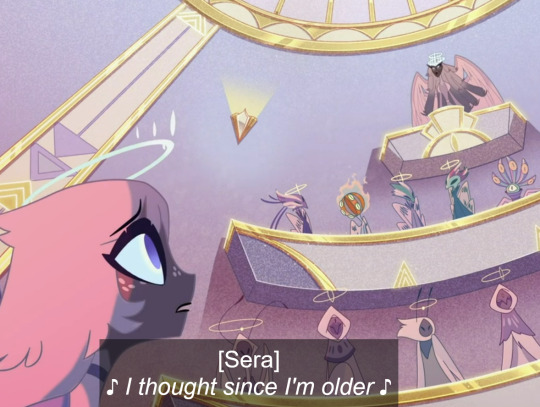
and the other thing we know for sure about her is that she is the High Seraphim (we don't know WHAT that means exactly but clearly it is a position of authority and rule)
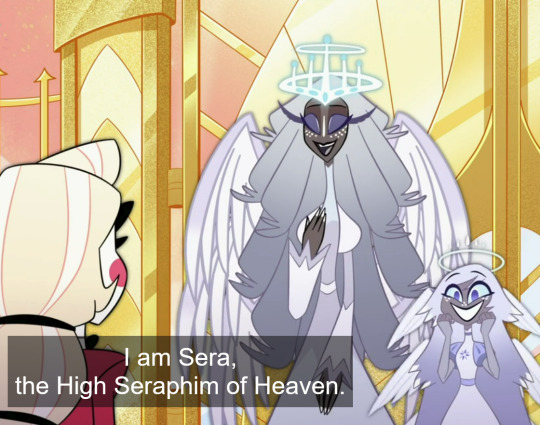
So those are the things we know for sure:
She's about as old as Lucifer
She approved the exterminations
She's older than Emily
and she's the high Seraphim
Now I'm going to circle back to all of these points but I want to start off with her relationship with Lucifer
Unfortunately for all of us, the only thing we can say about their relationship with 100% certainty is that they for SURE know each other, either because they were essentially "coworkers" in the past, or because they're both the respective rulers of their realms (even if Sera has some people above her) and they're implied to interact with each other
(at the very least you cannot convince me otherwise that they don't interact. Someone had to have talked to Lucifer about the exterminations for him to have had "approved it" and we know it wasn't Adam because Lucifer hadn't seen Adam since he fell to hell until the finale, and we know that Sera was not only the one to approve said exterminations but also decreed that no one else in heaven know about them. She clearly must have spoken to Lucifer about it because there's nobody else left who had the authority to do that AND knew about them)

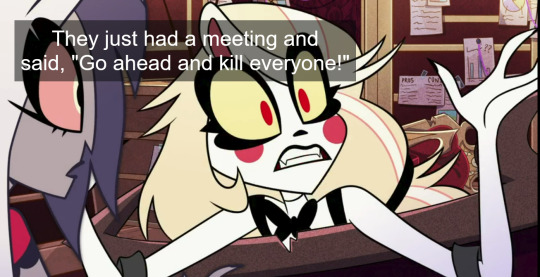
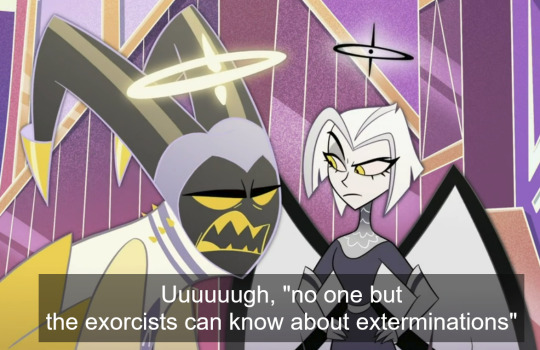
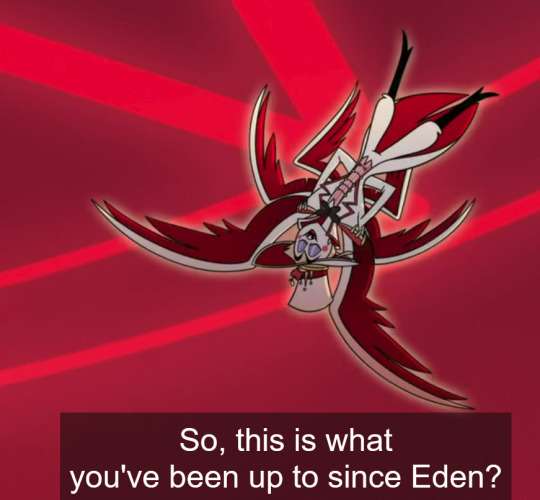
So at the very least in present day Sera and Lucifer have some sort of professional relationship as leaders. And I'll come back to this because it's implied that this relationship isn't a very good one, but first let's talk about the past
full stop, we have NO IDEA what sort of relationship Sera and Lucifer might have had when he was still in heaven. But here's the thing, even if their relation was strictly "yeah I know them cuz I work with them, but that's as far as it goes" Lucifer's fall STILL would have been horrifying for Sera to witness. He was the same rank as her, probably no other angel except the elders likely ranked higher, and they still banished him. Charlie's storybook leaves it at that, but Lucifer implies it was violent in his debut episode.
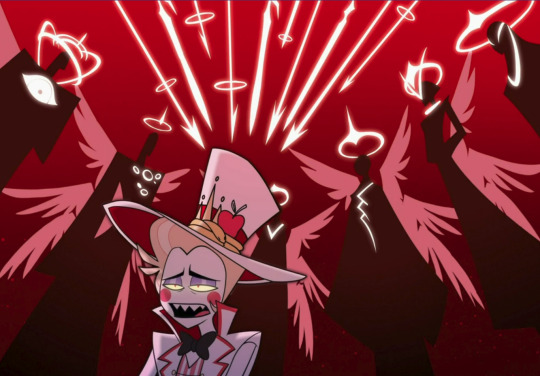
trauma is a funny thing when you think about it, you're just as likely to develop trauma by watching someone else be assaulted as you are for you to have been assaulted. And Sera was there, she likely saw the whole thing happen. So not only did Sera watch how brutal the elders could be to someone who questioned and disobeyed the order, but the fact that it was done to LUCIFER someone of equal rank and authority as her means that absolutely NOBODY is safe from the elders
and this is without taking into account that on some level, she and Lucifer had to have been close. There are no other seraphim in heaven besides her, the elders (who appear to be rather hands off and uninvolved) and Emily. Emily was likely created as a replacement for Lucifer, so at the time, it was basically just her and Lucifer as the only seraphim up there. They not only worked closely together, they likely had a close bond as well. Now I have my own head canon preferences as to what kind of bond, BUT let's ignore that and look at 3 options (although there are likely more, but huuu this post is gonna be long already so let's not push it yeah? )
option 1: equal peers. You are Sera and you've known Lucifer all your life. You two have "grown up" together, learned about the world and your powers together. You're comrades in arms! You know all of each other's secrets! You lean on each other for support as you lead heaven together. You work together all the time. Sure, he can be a little excitable at times but it's so much FUN right? This guy could be your bestie/brother. And you sit back and watch as the only ones with more authority than you, skewer him and banish him to hell for having questioned the order and now there's a metaphorical spear against your back at all times because you know it could have been you instead, and it could still be you if you don't behave
Option 2: Lucifer is your mentor. He's taught you everything you know. The ropes, your powers, the world. He's fantastic! You admire him greatly. He has such energy you could never hope to match. You put him on a pedestal, and in one fell swoop the only people he answers to destroy your mentor in front of you. You are now alone, without any more advice or guidance other than a warning to not step out of line as your mentor once did
Option 3: Lucifer is your apprentice. He's adorable! A little over enthusiastic but who doesn't love someone who's passionate about the things they like? He brings a wonderful energy and vibe, and... he's your responsibility. You try to reign in his wild energy only for the elders to step in and banish him because you failed him and now you know that the elders could do that to you too
So, I'll be honest, option 3 is NOT the one I'm biased towards, but if it ends up being that one, it would make Sera's behavior towards Emily extra heartbreaking. She already failed one apprentice, she will not fail another one, right?
Either way, Sera is terrified of going against the elders because of what they did to Lucifer in spite of his rank. She knows first hand how harsh they can be and because of that, she will do everything in her power to make sure nobody around her falls into the same fate. No one will ever question the elders again, and she will lie and withhold information to make sure that happens
And we're just talking about the INITIAL banishment.
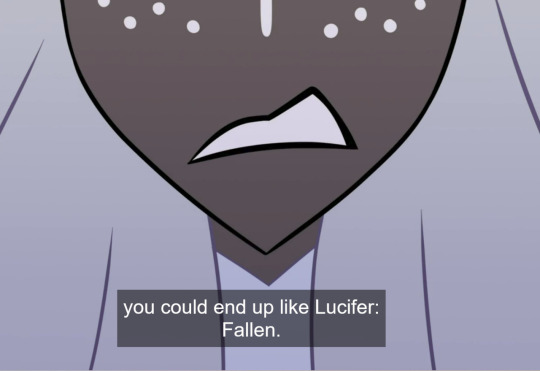
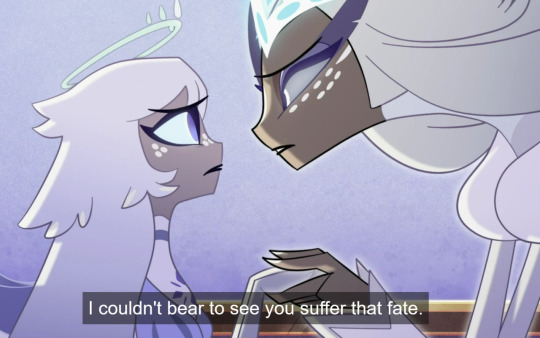
Now why would Sera bring this up, unless what she was most afraid of wasn't even the initial banishment, but of the suffering she clearly knows comes afterwards? And why would she care or even know about the suffering? Well, if it's true that she and Lucifer were close, then regardless if she was spying on him or not the way we know heaven can do, she still watched a cute enthusiastic little angel go from this:
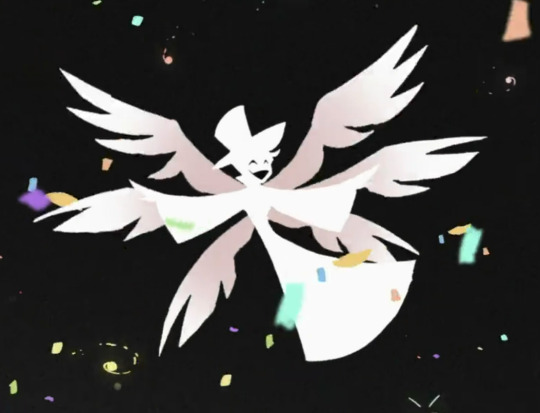
to this
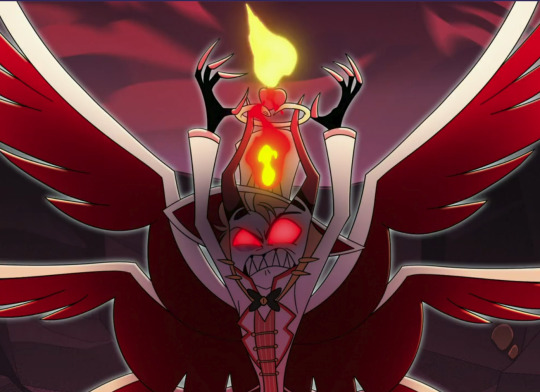
all because because he suffered.
She watched him question, get banished, suffer, and change into someone she didn't recognize, in real time. And the worst part is, she's not only scared of what happened TO him, she's personally scared OF him and what he's become. He might be fallen, but he's still a powerful angel
And this segways into another bullet: she approved the exterminations, but WHY
Charlie's intro implies it was as some sort of punishment towards Lilith who was rallying the demons and they felt threatened
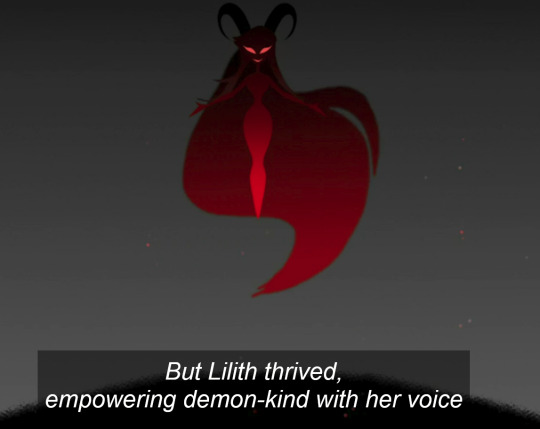


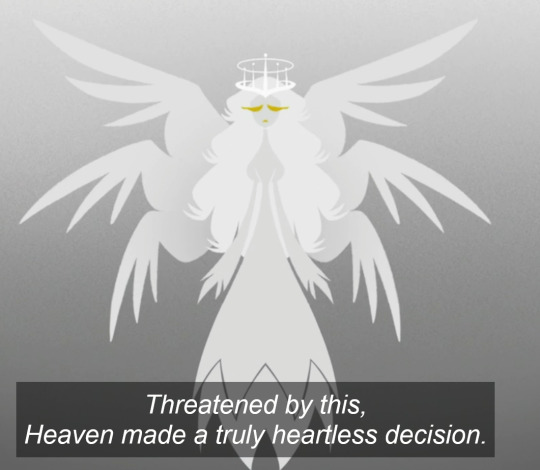
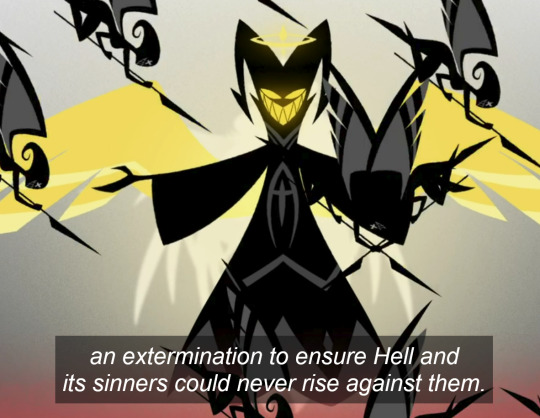
But clearly there's more to this
So first thing I'd like to point out, Sera doesn't look happy about this decision. She mentions as much in the song "You didn't Know" when she outright tells Emily "It was such a hard decision" and earlier in the same episode she outright tells Adam she wouldn't have approved of this if she had known it'd make things "worse"
But this is incomplete. Something doesn't make sense. Sera clearly meets with Lucifer for certain matters as previously established, and Lucifer, in spite of his initial trauma "NO CHARLIE DO NOT TALK TO HEAVEN" knee jerk reaction, never doubted that he COULD in fact get her a meeting with heaven. He outright tells her at the end of episode 5
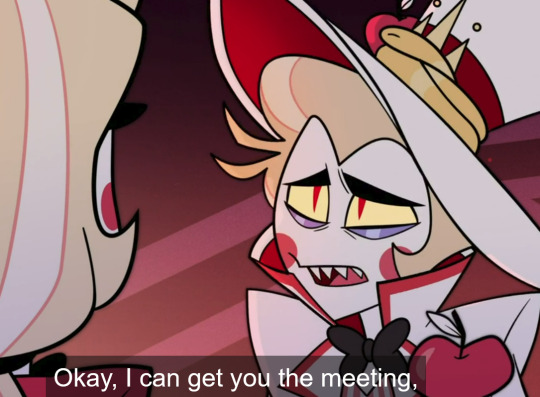
He never says, "I'll try to get the meeting". He says straight up, I can do this. There isn't a doubt in his mind that he can get this meeting. He knows Sera will meet with him/take his call (idk how he contacts heaven) and will agree to the meeting. We don't really know WHY Sera agreed to this if she thought it was a bad idea and never really intended to entertain the idea to begin with, going as far as to tell Adam to rig the results and calling Charlie misguided. So what's up? Why on earth would she agree to it? Well...?
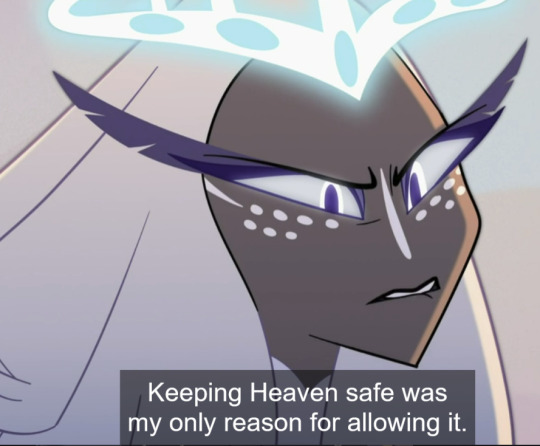
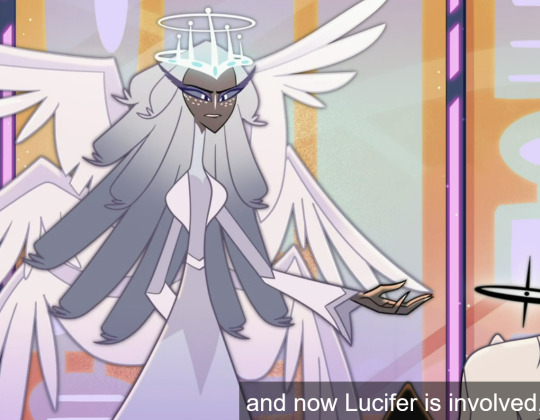
Sera is scared of the demons of hell, hence why she approved the exterminations, but she's even MORE scared of Lucifer and folded to his request. (or idk maybe there's more going on here and she feels guilt about what happened to him so she folds to him sometimes idk, but for the sake of this meta, SHE'S SCARED OF HIM)
but here's what's kinda weird. Charlie's storybook only mentions LILITH'S involvement with the demons rising in power, not Lucifer. Sera later claims that they were uprising to Emily as the reason she's scared of them and that it's her job to keep everyone safe.
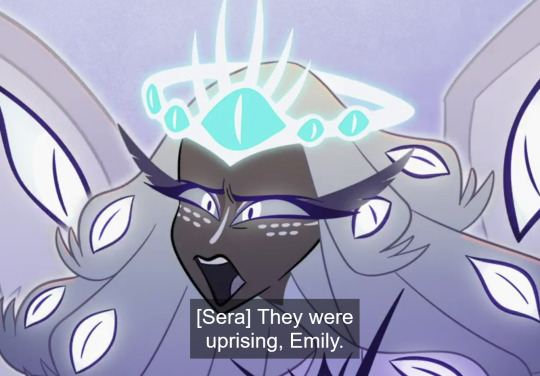
Clearly SOMETHING happened between the creation of Hell and the exterminations being approved that involved BOTH the sinners AND Lucifer that made Sera scared of both. Sera doesn't seem the type to fear without reason. She fears questioning the order because that incurs the elders' wrath. She fears the elders because of what they did to Lucifer. She fears angels falling because she saw how much it hurt Lucifer. Sera is not the type to fear randomly. Clearly there is some sort of thing that happened that made it clear to Sera that Lucifer is to be feared enough to fold to his requests and that the sinners are dangerous enough that it justifies genocide.
And now to bring back the whole Sera is older than Emily. Emily didn't know this otherwise Sera wouldn't have needed to tell her. AKA Emily wasn't even around when said conflict happened. Sera not only had to go through something that clearly traumatized her to the point where she agreed that genocide was a reasonable response, but she had to go through that ALONE. Trauma is hard enough to deal with, but to have to navigate it alone really gives it some steroids it has no business in having
This genuinely makes me wonder how long the exterminations have to have been taking place. It probably took a WHILE for hell to gather up enough numbers that they started making buildings by the look of Charlie's storybook, AND THEN did something against heaven, so this was not happening from day one of hell, far from it. And this also makes me wonder how old exactly is Emily? She strikes me as extremely young
season 2 come out please, I'm working from CRUMBS here, there is so much we don't know
But yeah, all of this to say, Sera isn't just some alpha bitch who's prejudiced against demons (not to say there isn't bias there, there ABSOLUTELY is, ugh) but at her core, she's a leader who underwent a lot of trauma and she's full of fear and she makes decisions, rational, moral or not, based off of that fear. And yeah unfortunately, fear, especially trauma based fear, messes with us in ways we never would expect
a kind man may suddenly resort to violence. The confident argumentative person, may instead end up frozen. Someone who thought they valued their family all their life instead runs away. We may regret what we do in moments in fear, we might even logically know that we're making bad decisions, or decisions that go against our morals. Sera CLEARLY hates that she made the decision to approve extermination, but she holds onto it steadfast because it alleviates the fear
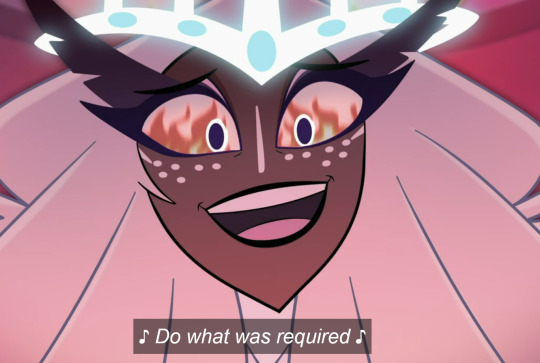
Funnily enough, I don't particularly LIKE Sera. I dislike her microaggressions towards Charlie and her attempts to sabotage her efforts at the meeting by calling upon Adam. But as a writer, looking at the clues I got to say she's a very interesting character to me. She seems like a reasonable authority figure, but she's so full of trauma that she's letting her fear make all of her decisions for her
#hazbin hotel#Sera#sera hazbin hotel#lucifer morningstar#lucifer#Meta#Analysis#character analysis#ugh I wanted to talk about so many other things too#but they would derail the overall topic of SERA#so idk maybe be on the look out for more meta from me?#I almost went off on a whole tangent on how Lucifer and Sera respond to trauma in an eerily similar way#Lucifer was so desperate to just give Charlie whatever she wanted#but the second she said the magic trauma words#there was no hesitation no thoughts on his part just immediate IDEA SHUT DOWN#like the way when you touch a hot surface and the signal of HOT doesnt even reach your brain#your spine just yeets your hand away from it before you can even process what happened#that's what happened to Lucifer#he heard HEAVEN and immediately said NO#Sera is similarly also shutting down ideas from Emily due to#get this#THE SAME EXACT TRAUMA#(lucifer's banishment by the elders)#idk it's pretty fascinating#but yeah Sera isn't a bitch or an asshole she's just scared#for herself but especially for the people she loves
60 notes
·
View notes
Note
I would love to hear your thoughts about the Black Rose arc: what actually happened in the past, how any of the shit that goes down there actually helps Akio, any thoughts you have to throw at it honestly that arc is still kinda baffling to me
Sorry for taking so long to answer this one anon, I'm currently trying to move apartments! Also this is a DOOZY of a question because the tl;dr is my interpretation of exactly what happened during black rose constantly shifts. Quite frankly, the exactly circumstances of Mikage's past is so nebulous, that "what actually happened" might honestly not even be the right question to ask (but we shall try regardless!). Fair warning, this gets long as fuck.
So, to begin, here are the things I think actually "happened" in Mikage/ Nemuro's past:
A teenaged, socially outcast "genius" named Nemuro is recruited by the equivalent of the student council (100 boys) of the past, without knowing or caring what his work is for. He considers himself incapable of emotion, and seems to even lack passion for his work.
He meets a woman named Tokiko, who is involving herself in this process in an attempt to preserve her terminally ill brother. He also meets said brother, Mamiya. Both leave an impression on him, causing him to suddenly understand his fellow student's pursuit for both emotional connections, and their drive to gain power/ eternity.
Akio eventually approaches him with a letter and a ring, commanding him to do something that is not clarified to the audience, officially letting him in to the "council" of 100 boys.
Some time after this, Mamiya dies. Nemuro burns down the building they were conducting their experiments in, which he defends as necessary. Tokiko rejects this action, and shortly after leaves Ohtori.
These are pretty much the things i can say with like.... 99% certainty are actually true of the past. But obviously, that leaves quite a few gaps. So let's talk about the whole of black rose and the symbolism and meaning it presents, and try to see if we can work backwards from there.
Black rose is, mainly, an exploration of the first arc's duelists through their various foils and related side characters. Each black rose duelists not only expands on previously minor character's desires and flaws (setting them up nicely to pair with the final set of duels), but highlights the main duelist's own by contrast. This being said, it is clear through both visual similarities and spoken ones, that Mikage is intended as a foil to Utena, and through him we are intended to understand Utena and her motivations for fighting these duels more deeply.
It is also the arc which begins to introduce the audience to the more abstract nature of Ohtori - where before you could mostly excuse time and spacial inconsistencies as silly magical girl hijinks, now the series forces you to see itself as less of a coherent sequence of events, and more as a collection of symbols presenting an emotional truth about its characters. We begin to understand the idea of "what exactly is happening" is less important than "what is this character feeling and thinking? What is the world through their eyes?" Which again, serves to have us understand our main duelists on a deeper level.
So what understanding are we gleaning from this arc? Well, I would say the main idea we can draw from this arc is that human memory is incredibly malleable and prone to deterioration, and the pursuit of the perfect preservation of memory (eternity) is essentially a fool's errand. This was already an idea introduced to us in the first arc - most obviously, I'd say, through Miki and his idealization of his past with his sister - but it becomes even more blatantly true in this season as we watch a literal dead man walking become so thoroughly manipulated by Akio that he doesn't even remember the face of one of the only two people he's ever claimed to care about, despite his motivation of preserving said person.
Throughout the two episodes that end the black rose saga, we see a distorted version of Nemuro's life, one cut up and pasted over to focus on things that will ultimately drive him to the actions Akio wants him to take. Seemingly, Tokiko is the one he falls in love with, and is the one to motivate him to reach eternity (the fingers point to her, her cup with the lipstick stain, her kissing Akio instead of Nemuro), and yet Mamiya is the one whom Nemuro pictures by his side, whom he kisses on the bleeding fingers, who he tells is suited to the role of Bride. He reconfigures his burning of the Hall as a grand sacrifice at the hands of Mamiya, a necessary step towards reaching eternity like they both want, and yet it was he who started the fire, Mamiya having been long dead, and having clearly stated before his distaste for the stasis of eternity.
These inconsistencies parallel Utena's own, to the point that they essentially serve as foreshadowing to her own end. Utena (Mikage) reconfigures her childhood concern for Anthy (Mamiya) into a more traditional, heterosexual crush on her prince (Tokiko), which motivates her to become part of the dueling system. Utena (Mikage) wishes to help Anthy (Mamiya) but she disregards Anthy's (Mamiya's) personhood and plays into Akio (Tokiko's) desires instead. She refuses to confront inconsistencies in her memories, or the possibility that the meaning and goals she gleans from them may be harmful, because they carried her up until now - this is blatantly said in the conversation between Mikage and Utena, and it is true for both. Their precious memories leave both in a state of eternal adolescence, constantly seeking their glimpses at eternity, but unable to see how they are being used for it.
That, I believe, is the core of the arc and its purpose and the general gist of what happened. I suppose that really leaves the question: what was it all for, exactly? And to that end I say... what is any of the dueling system for? Akio's purposes are just as vague as anything else in the series, and its because he himself is a seeker of this empty "eternity." His main goal is to keep everyone in the same stasis he is in, so he can maintain his position of power, while toying with the idea of returning to his own idealized past self. Most of what he does is cruelty for cruelty's sake, with a thin veneer of "purpose" behind it to justify it to himself and others. It's only when Mikage and Utena both confront the truth of their memories and let go of those implanted ideals, do they graduate from Akio's influence, a "death" in the eyes of those unable to look at the world outside Ohtori.
142 notes
·
View notes
Note
Since yesterday we talked about my *favorite* story: I think what really confuses me about the NFCV fans who defend Hector's writing by praising his final action, letting Lenore go, as the rightful conclusion of his character arc... is that it only works if you completely memory hole S3.
Hector is introduced as someone who burned his own parents alive after a childhood of abuse, bitter enough to believe humanity needed to be culled. From this perspective, him learning to forgive Lenore, or at least granting her mercy and dignity, could be a good character development. But Hector through the show was not written to be bitter, vengeful and violent: that was Isaac.
Or alternatively, Hector's biggest flaw is that he needs to be loved, so much that his favorite spell is reanimating dead animals so that they could love him unconditionally. He forces those creatures to him. He keeps this behavior by clinging to Dracula, then Carmilla (he could have ran away, he chose to stay with her after Dracula's death), then Lenore (after Carmilla's death and Isaac making him live, Lenore became his only certainty in life). From this perspective, him not forcing Lenore to live an existence she didn't want to live, but accepting her decision, could be poignant. But Hector never actively sought anyone: he was swayed and lured in. Besides, his pets stopped being relevant after S2.
Hector's arc was one of passivity. You can't miss it: even Isaac points out that Hector lacked agency. Hector spent his entire arc being thrown around left and right, lied to, beaten, humiliated, dehumanized, and he simply... existed. He has no objective, he barely has any negative emotions. Hector in S3 was a blow up doll, and we audience were meant to laugh at his stupidity while jerking off over the submissive and breedable peggable guy being called "good boy". S4 pretends he grew, with his working behind the scenes to resurrect Dracula, but it's not enough, for all the reasons we know. That's why him letting Lenore go feels like the last spit in the face for him: not only Hector is the only character in the season who is left with a bittersweet ending at best, but... he didn't do anything to affirm himself. He didn't choose to leave Lenore: Lenore chose to leave him, and he simply nodded to that. He didn't talk to her about their problematic relationship, now that nothing was between them. He didn't take the chance to recognize his own self-worth in the same way Isaac did. We don't know what he plans to do with Isaac, we don't know if he plans to leave the castle at some point. The pattern of him going "sure why not" at everything thrown at him was not shaken.
(I don't need to tell you that as someone who loves the original Hector's story precisely for the way he seizes agency for himself, this pisses me off something fierce. More idealistic? Maybe, but also encouraging.)
I'll be honest: Hector as a character is so empty that I feel his fans simply project themselves into him, especially victims of abuse who see the way he crawled back to Lenore and think that it was an intentionally nuanced representation of the way abuse twists your mind and priorities. And if his story resonates with you, I can't take it away from you, but I can assure you that the guy who spent a whole episode writing his puppy fetish for no reason other than fanservice does not give a single shit about the realism of abuse, let alone the things he was accused of.
And I wonder if the same can be applied to other aspects of the show, like Trephacard's friendship that straight up doesn't exist on screen, or Isaac's "development" which might resonate with people similar to him. Just a lot of projecting and filling in the holes, of which the show has plenty because it would rather waste its time with pointless filibustering and people being mean and crass to each other or piss jokes.
This is gonna sound very cynical but the main reason for the show's success is, essentially, that it's superficially deep and insightful.
Superficial presentation can go a very, very long way in hiding very egregious writing flaws, stuff like great fight scenes, emotional music and dialogues that sounds very cool, philosophical and deep can easily convince people that what they're watching is far more than it really is. These are cases where, if you don't pay attention to the finer details, you would really be led to believe that it's exactly what the show is presenting itself as
As another example: Sonic fans, even after all of these years, still like to parade Mephiles around as the best written villain in the series, even though his plan makes less than zero sense. This is because he looks cool (?), has cool powers, has a cool voice and the game consistently presents him as a mastermind...so folks fall for it, it's all about the vibes and how they emotionally impact the viewers, who in turn don't tackle the material with actual critical thought. Some seem to do so, given the plethora of in-depth analysis of characters like Isaac, but, and I know this is really offensive of me to say, I think they are still being influenced by the emotional impact of the way the story likes to present itself, preventing them from truly being 100% objective
People see Hector's pseudo philosophical speech to Lenore, they see her killing herself with the beautiful cinematography and music, and they mistake it for actual art, because it makes them forget or reinterpret the likes of S3. The reason why so many undermine or even justify Lenore's treatment of Hector in S3 is not, I believe, out of genuine rape apologism, but rather becaus people have a subconscious need to have everything neatly fit into their view of events
The ending of S4 looks so beautiful and deep and meaningful, but their relationship in S3 is in direct contradiction of that, so instead of recognizing that they twist the facts in their own head in order for all of it to make sense, because if you admit the existence of S3 as it truly was to yourself, then S4 and it's "beautiful" emotional impact falls apart like a ton of bricks
This is sounding very arrogant if not downright misanthropic I know, as I'm essentially saying that people don't know how to consume the media they like and that they don't even truly know what it is that they like. I feel a bit ashamed in saying this because it's the type of reasoning that would anger me usually, especially if directed at me, so in a way I guess I'm being hypocritical...but I truly don't see any other way to explain this phenomenon
Isaac is, of course, another good example: it's "easy" for most people to forget his hypocrisy because the show puts such a laser focus on his "development" and emotions and philosophy etc. It's like dangling keys in front of a toddler in order to distract them from some other thing
Something like Other M could have had the same effect, but the difference I feel is that Other M is far more egregious in its superficial dialogue: Samus sounds boring and stupid even at a surface level, she can't fool the audience, and Adam's character doesn't feature nowhere close as many "distractions" from his shitty behavior, especially since the authorization mechanic is pervasive throughout the whole game, so people immediately see what a douchebag he is and how self contradicting the story is about him.
18 notes
·
View notes
Text
Aside from anticipating getting my heart ripped out and stomped on during the dramatic developments that were teased in the upcoming quests, I'm also intrigued to learn more about Neuvillette because, despite apparently being notoriously impartial and proper as the Chief Justice, he does seem to have something going on: I can't tell yet if it's
a) a sense of doing things "for the greater good" b) naiveté regarding human emotional/thought processes, including his own, or c) active inconsistency/cognitive dissonance.
Or perhaps a combination of multiple factors.
He was completely unbothered by Navia lying to get into his office without an appointment (bypassing standard procedure), and now, according to the 4.1 trailer, he's apparently going to submit false charges against the Traveler to get them into the Fortress of Meropide--something that he stated earlier was taken very seriously and is itself potentially subject to criminal charges should it fail.
I'd attribute these with relative certainty to a) (possibly/partially b)) if it wasn't for one more inconsistency I noticed:
During Lyney's trial, discovering the true culprit was sufficient to acquit him without an additional verdict from the Oratrice.
However, when charges where pressed against Childe, after incriminating Marcel as the true culprit, Neuvillette subjects Childe to another round of judgment by the Oratrice, insisting that "This has always been the rule."
(Clearly not, because it apparently wasn't 'the rule' one Archon Quest ago...)
I realize that brings into consideration the additional factor of the Oratrice and how it operates, about which we still know essentially nothing--although Neuvillette apparently has a hypothesis and has previously considered the possibility of the Oratrice delivering an illogical verdict, so it's possible that I'm overthinking things, and this could simply be a subtle or backhanded way for him to produce a specific reaction from the Oratrice and hence kick-start the investigation, so to speak.
I'd hate to consider Neuvillette suspicious at all because he's so sensitive and kind on the inside that I want to believe he has nothing but good intentions, but I'm not good at speculating--I don't know enough about the story yet to draw any solid conclusions, even though some things just don't seem to add up. I think the same emotional naiveté that makes him so endearing as a character is probably a significant factor--that said, given that he's allegedly a very capable Chief Justice and has been around for hundreds of years, it's not unreasonable to believe that, in some regards, he very much knows what he's doing.
I find it especially intriguing in my particular thought process juxtaposing him with Alhaitham (my other favorite who, indeed, lives in my head rent-free), because... from a narrative standpoint, they're similar in that that they're both stoic as to be enigmatic, they both hold positions that grant them considerable autonomy, and they utilize said autonomy--as well as the abundant resources at their disposal--to assist the Traveler.
...But Alhaitham, on top of being incredibly perceptive rather than naive, is also incredibly consistent. Many players found find Alhaitham untrustworthy because he's highly self-assured and only agrees to collaborate with the Traveler under very specific conditions, with very little flexibility, refusing to bend to anyone else's will solely to appease them. As the Traveler later states, though, this actually makes him extremely reliable as an ally, because Alhaitham is candid about being primarily motivated by a strong sense of self-preservation. He's incredibly selective about how he expends his effort; he's unlikely to flat-out betray an ally because it would simply be too much work for him to set up a genuine, trusting, mutually beneficial relationship with someone, only to jeopardize it later. If he doesn't intend to cooperate, he just says so. ("Until you complete this task, you don't have question privileges" etc.)
Personally, I was inclined to wholly trust Alhaitham from the beginning due to this consistency.
Neuvillette, on the other hand, despite holding position as the Chief Justice, doesn't seem to invariably follow the rules and laws to the letter as one would expect.
As I've already stated, I do want to trust him--and indeed, he's open with the Traveler about the fact that he is actively in the process of investigating the Oratrice, and, even to him, there's just not enough information to draw any conclusions. Factoring in all of the above inconsistencies, though, I think it's as unfair to conclude that Neuvillette is downright nefarious as it is to assume, on the other extreme, that he's wholly benevolent, so I'm going to remain cautiously optimistic while I anticipate further developments from the Fontaine story in the upcoming version. 😆
42 notes
·
View notes
Text
TLJ Revisited
TFA did not blow me away when it came out in 2015. As a long-suffering prequels fan I didn’t like the anti-prequel dog whistles in the months leading up to the film, I didn’t like a lot of the crazed fanboys gushing how it was the best SW movie ever and thank goodness they wrested it away from that horrible George Lucas. I didn’t like that Disney took Lucas’s outlines and for the most part trashed them, which publicly made Lucas unhappy. While watching the flick, I was like a bitter ex noticing every flaw of the new trophy wife. The story structure was not nearly as good as any of Lucas’s six films. It was too derivative of ANH. And worst of all, I had a real yucky feeling about what this trilogy was all about. There was a nihilistic subtext to the whole thing: Luke failed as a master, Han and Leia failed as parents, and the only scion of the Skywalker clan was almost certainly doomed for death since he was a bad guy and killed Han Solo. It seemed like a setup so that new heroine Rey would essentially take over the story. I couldn’t understand why it seemed I was the only person who seemed to notice this.
Then, five years ago, TLJ came out and for two years I had hope, even certainty, that maybe I’d misread the trajectory the trilogy was taking.
Dammit, I hate being right.
That said, TLJ remains something of a slightly nicked masterpiece. It is the best film of the sequel trilogy, that’s for sure. I liked the film when I first saw it. I was pleasantly surprised and well, we all know how I feel about Reylo. Yet when I look at what I wrote about the film right after seeing it, it seems like I was still pretty tough on it. I think in retrospect I was still annoyed by a lot of aspects of TFA and the story elements it introduced.
So five years on, I thought I would take an honest reassessment of the film. The good, the great, the bad, and the ugly.
First I want to address the perpetual controversy around TLJ. The curious thing about TLJ is how much anger it still inspires, to the point of irrationality. It’s one thing if it’s not your favorite SW film or if you didn’t love it. It’s one thing if you have problems with it. But I make no secret of what I think of TROS and I still don’t hate everything about it nor do I spend all of my time complaining about it. It’s almost as though a lot of the narrative and characterization problems TFA raised were ignored when the film came out and then when they inevitably materialized in TLJ, Rian Johnson got blamed for them. Luke exiled himself to that island for a reason and Johnson had to find a pretty extreme reason to explain why Luke would take that drastic of an action. The Luke in exile thing was one of the few aspects of Lucas’s outlines that actually made into the movies; he was set to go Col. Kurtz regardless. But angry fans don’t care about any of this. They think Johnson is some iconoclast who’s just tearing down Luke because he can. Mark Hamill’s public complaints about it didn’t help. The rest of it was anger over dashed theories over where TFA was going to go next. Really, it’s nuts. Who gets this excised over a movie? How does any honest person sincerely believe Rian Johnson is a mean, hateful person who only wanted to destroy someone’s cherished memories of Star Wars?
Okay, on to the movie itself.
A lot of what I still find flawed about the film comes from what was flawed about TFA. The whole galactic set up made no sense to me and while Jason Fry’s TLJ book explains it to some degree, that explanation is missing from the film. Lucas and Co. were great at worldbuilding while telling a story about a core of characters at the same time. The sequel guys, not so much. It’s just Empire vs. Rebels 2.0 without going into the how's or why's. It still makes little sense to me is Luke saying he didn’t want to be found, he just wanted to live out his days on Ahch-To, yet there’s a map to find him.
Another problem is how TLJ picks up immediately after TFA. Johnson didn’t really have much of a choice because of how TFA ended. So unlike the other SW films, there’s no narrative “breathing” room with this one. There’s no opportunity for the characters to grow or relationships to build or even for the characters to process what has happened to them. Compare that with TESB, where you can see Luke being a committed Rebel or a blossoming relationship between Han and Leia. Or with AOTC, where Obi-Wan has been master to padawan Anakin for 10 years and Padme has become a senator. I think that serves the Star Wars story better. This way makes the ST feel like a movie adaptation of a really long book they broke into two or three parts. And because Johnson had no idea what they were going to do in IX, his hand was forced to put everyone still alive back in their corners at the end of the film.
If I wasn’t going to include more of Rey and Kylo Ren, I would’ve included less of the rest of crew with the exception of Rey’s scenes with Luke. Simply put, Reylo is by far the most interesting aspect of the sequel trilogy and TLJ’s scenes with them are so compelling it’s easy to lose patience with the other threads. I don’t mind the Canto Bight stuff or Poe’s catfight with Holdo. I love Rose. But there seems to be a requirement that every sequel film must firmly focus on the Rebels because that’s who we’re cheering for. The problem is that in TLJ, you have two elder Skywalkers with a smaller role and their only scion is “the bad guy” who has less screen time than any of the major heroes. This continued the problem I had with TFA, that the Skywalkers were kind of side characters in their own saga. Johnson tries to take Finn and Poe and craft actual story arcs for them but it was always a little unclear as to what their role was in the bigger scheme of things. I guess we’re supposed to understand Poe is something of Leia’s heir apparent in the Rebel leadership but he’s also the house flyboy. As I posted in my original review, Poe is Wedge Antilles with a bigger role. Finn has a kinda clingy relationship with Rey and this bromance with Poe but he has no real connection with Luke, Leia, or Han. There are good things about his arc in this movie but it doesn’t answer the question, what’s he doing there? What does he bring to the table? I wish they’d kept the stormtrooper rebellion in this film or in TROS. And there’s no indication at all he has any affinity for the Force. There seems to have been insufficient communication all around as to who these characters are, what they’re supposed to be doing or what they're supposed to become.
I’ll never understand why the sequels avoided any “alien” seen in episodes I-VI like the plague. I never found the designs in the ST to be anywhere near as good, even factoring in the Rick Baker masks in ANH.
And if I may be so nitpicky, I don’t like the use of “big ass door.” It seems too much our world, not the GFFA.
Finally, I find it interesting that after noting both sides use war profiteers and Rose delivers an eat the rich (profiteer) speech about Canto Bight, we got a might makes right conclusion where it’s all about kicking the bad guy’s butt. The war’s on, baby! Look, if your message is the bad guys are evil and it’s a cancer that needs to be removed from the galaxy, stick with that. The other stuff is kind of a distraction that ultimately doesn’t mean anything to the narrative.
Okay, on to what I like/love about TLJ. Namely, it’s a brash, bold, beautiful film that in a lot of ways was just what Star Wars needed. I really worried this was going to be TESB Karaoke, and thank goodness Johnson had more sense than that. It’s a movie that parallels TESB and AOTC with occasional nods to each film; Johnson understands the difference between homage and just repeating what some other movie did. TLJ still feels like its own thing while adhering to the rhythm of the prior trilogies.
Johnson’s wisest decision was to get Adam Driver out of the Kylo Ren mask and take full advantage of Driver’s talent. Sure, it probably made the marketing department mad but man, what a performance. Today, I think that the timing of the film’s release and the trophy crowd’s disdain for Star Wars other than for the technical stuff, as well as other factors, hosed Driver out of a deserved supporting actor nomination. Kylo Ren was popular before TLJ but this film turned him into one of the most memorable and complex characters in the nine film saga. It also IMO made Adam Driver a bonafide star.
But Johnson is one of those “actor’s directors,” coaxing very good to terrific performances from his other cast members. Daisy Ridley’s Rey in TLJ is absolutely luminous: emotional, curious, occasionally funny, vulnerable, impulsive, compassionate, and in the heat of battle, feral. In her scenes with Kylo/Ben, she meets him toe-to-toe whether as enemies or as allies with the hint of something else brewing between them. As I’ll get to in my upcoming Reylo Heresies, I think we tend to forget that she commits wholeheartedly to Rey, which for a whole list of reasons isn’t an easy thing to do.
Well, here’s another heresy for you...I think TLJ remains up there with TESB as Mark Hamill’s best turn as Luke Skywalker. For all of Hamill’s kvetching and fanboy rage their hero was besmirched by that dastardly Johnson, Hamill did a great job. Luke’s scenes with Rey are great and his cranky reluctance to embrace his destiny were well performed. His great sadness at his own downfall and his wise wariness of a quickie conversion for Kylo add new depths to his character. His final duel with Kylo is an amazing cap to his legend. A lot of old fans like me were never happy that the ST set up our gang as failures and Luke’s behavior seemed a little harsh to me the first time I saw the movie. Then through subsequent viewings it didn’t seem so bad. I guess some fans never got over their initial shock.
Like I said, Johnson admirably sets up character arcs for newbies Poe and Finn while introducing new characters like Rose, DJ, and Admiral Holdo. I’m happy to see Laura Dern in anything. What a get. Same deal for oddball Benedicio Del Toro as DJ. Kelly Marie Tran got too much stick from idiots on the internet; her Rose is a delightful, charming character who teaches Finn what heroism really means and how to embrace something bigger than himself. Domhall Gleeson gets some fun moments as General Hux, Gwendoline Christie drops by for a compelling final battle with Finn, and BB-8 is as adorable as ever.
This was Carrie Fisher’s last actual performance in Star Wars and there’s something fragile and vulnerable about her turn in this movie. Few things can beat Luke’s reunion with Leia on Crait for pure poignancy.
Johnson also excels at visuals. It’s a beautifully shot movie, whether its the harsh interiors of the Supremacy, Snoke’s red throne room, Ahch-To, or Crait’s salt plains. The scene where Kylo and Rey touch hands is one of the greatest demonstrations of the need for connection and belonging I’ve seen in any movie. I also love the part where Holdo goes into hyperspace right through the Supremacy, splitting it apart just as Kylo and Rey “come apart” and the Skywalker lightsaber is split in two. I could go on and on about the many great shots in this movie.
Thematically, TLJ is very much in line with Johnson’s brand of populism. While the Skywalkers struggle with the weight of legacy, Johnson elevates “regular” Rebels like Rose and establishes that Rey--everyone’s last hope-- is...nobody. TLJ makes the case that anyone could come from anywhere and be a hero. Even the “villain” could be heroic for a minute or two if he lets himself.
It also makes the case that the purpose of legends is to inspire those people in the first place. This is demonstrated at the end of TLJ, unique among SW films in that it doesn’t feature the main characters in its coda. A slave kid on Canto Bight is inspired by Luke’s story, telling his friends about it as they play with their action figures, then holding up his broom stick like a lightsaber. TLJ is unique in that it’s the only SW film to basically comment on SW itself.
As for Reylo, I think TLJ accomplished two things by emphasizing and building upon their relationship. One is that it made each character more interesting. Prior to TLJ I found Kylo the most intriguing of the newbies but I wasn’t terribly invested in him or Rey until this film. The other is putting them together opened so many possibilities. It’s tragic in retrospect that TROS didn’t take greater advantage of them. Reylo isn’t just hot or sexy, it’s also mythic.
So that’s my look back at TLJ. Stay tuned for the heresies!
70 notes
·
View notes
Text
Put simply in comic it is because in the original 616 Wanda was always sympathetic and never wanted to be a villain, while Loki was the God of Evil who had no interest in having a second chance. Wanda was usually forced into her bad actions, or something happened outside of her control. Loki did bad thing because he wanted.
House of M Wanda has had a full on break down, she's not getting help from any actual therapist and Emma Frost and Wolverine suggest killing her. They suggest that in front of everyone, to put her down. The reality she creates doesn't hurt anyone and things only fall apart after Wanda is attacked. Even then no one is killed, Wanda does take away mutants powers but it doesn't harm them.
In the comics people have every reason to distrust Loki and I think when House of M happened Loki had taken Sif's body and was working with Doctor Doom. Also, it should be noted during the kid Loki arc he had started to gain people trust. He became a young avengers, a hero, Thor was willing to do anything to keep Loki safe. Thor freaked out because he learned that version of his brother was essential killed and replaced.
A huge part of AoA is the self-fulfilling prophecy of treating Loki with distrust and how Asgard uses him. But also, currently in comics Loki has broken and Thor and Asgard has come to peace with Loki. Loki past still hangs over him, but he's allowed to hang out without much trouble. Wanda's past also hangs over her it always will.

Okay, but what about the MCU. Why there is Wanda given more of a chance the Loki ever is.
Well, character wise I think it's because Wanda turned on Ultron and helped the Avengers while Loki dug his heels in and continued with the invasion.
The Maximoff twins did not know they were working for hydra and with them being experimented on locked in cells I question how much choice they truly had. Much like Loki working with thanos, there's certainty wrongs he did, but how much of a choice did he really have.
Now don't take this as a defense of the series, but Loki is treated more pitiful and pathetic then he is irredeemable monster. I hate his ending, but it is treated as heroically.
Wanda kills herself. She is still treated with sympathy and more respect than Loki gets, but her ending is that she's too dangerous to live and crushed to death by rocks. MoM portrays Wanda as an evil unreasonable villain and then she dies in the end. Wanda had to die in the end to set things right.
There's the real difference between the two characters, respect. Loki is looked down on constantly. In his on series there is not a kind word said to Loki that is not barb with some kind of insult or condescension. It's not that Loki is ever portrayed as irredeemable, it's that people are constantly mean to him, and the audience is meant to go along with it and think he deserves to be treated badly. When people sympathize with Wanda, they are actually sympathizing with her. There's no gaslighting, there's no insults and there is no agenda of giving her a chance so she can do something for someone else.
Frankly, I think it comes down to writers don't really like Loki
Wanda and Loki are the biggest examples of Marvel’s insane character bias
In both the comics and MCU has done some really awful stuff like joining HYDRA and trying to chase down and kill a literal teenager (Avengers 2 and Doctor Strange 2) and killing almost all mutants (House of M)



But for some reason Loki in pretty much everything he has been the writers make everyone treat him like a irredeemable monster who deserves to either die or end up alone (specifically in Agent of Asgard)



I love both characters but Wanda always given a million second chances while Loki rarely given any chances at all
Also I’m aware that the comics are different from the MCU in terms of story and circumstances but it’s still something that I wanna call out
37 notes
·
View notes
Note
(Slides into ur messages) can I hear what u have to say about Dark Shadows and the theme of reincarnated love being attributed to Dracula? 🍿👀
crying throwing up etc yes you CAAANN thank you. and sorry it took me forever to type up this reply. it is,,,very long i'm so sorry i don't know how not to write essays when asked for a fairly simple explanation.
First of all, let me just say I'm not a pop culture historian and i don't live in the heads of anyone who's adapted Dracula, so I can't say with 100% certainty that any one thing inspired anything else unless it was explicitly stated.
OK! SO! I won't bore you with the entire history of Dark Shadows the television show. All you really need to know was that it was a live-to-tape Gothic soap opera created by a guy named Dan Curtis, who was a huge fan of classic horror (such as Legosi's Dracula films). The show adapted various horror classics like Turning of the Screw and Jane Eyre into a long running narrative about a rich family called the Collins, on the coast of Maine.
Initially the supernatural elements of the show were more subtle; but the show wasn't really landing and when the ratings started to tank around '67 Curtis and the writers decided to do something a little more bold and adapt Dracula. Just like in the book (spoilers for those reading for the first time!!) the vampire, Barnabas Collins, was meant suck some blood, kill some people, and die after wreaking the appropriate amount of havoc.
The thing about loose adaptations and Dark Shadows is that everything about it was made in an extremely adaptable format. The show was filmed live-to-tape every day and scripts usually only written a few weeks in advance; that meant that it gave the writers a lot of wiggle room to react to things the audience responded to well, and cut out things they didn't. And the audience really responded to Barnabas Collins; he was played by Canadian theater actor Jonathan Frid, who brought a lot of humanity to the part despite it being written in a very villainous way.
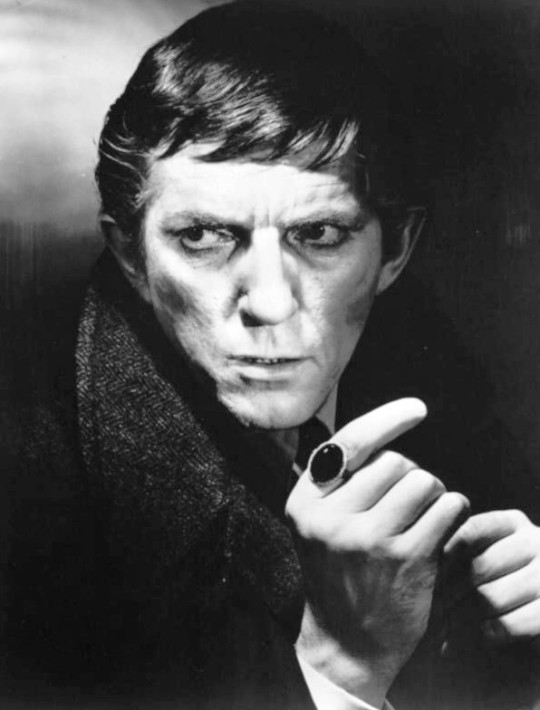
The writers had a prominent ghost around Collinwood named Josette Dupress who was often referenced in the early parts of the show; so they worked her into the story as having been Barnabas' doomed fiancé, who just happened to look exactly like a local girl named Maggie Evans. This kicked off the "Lucy" part of the plotline, but from here the writers began to deviate from the Dracula storyline. Once it was clear that the vampire was immensely popular (essentially saving the show from cancellation) the writer's began to tweak the character in order to justify keeping him around. They began introducing more human aspects to his character in order to make him more nuanced; one of the most prominent ones being his obsessive need to find and be reunited with Josette.
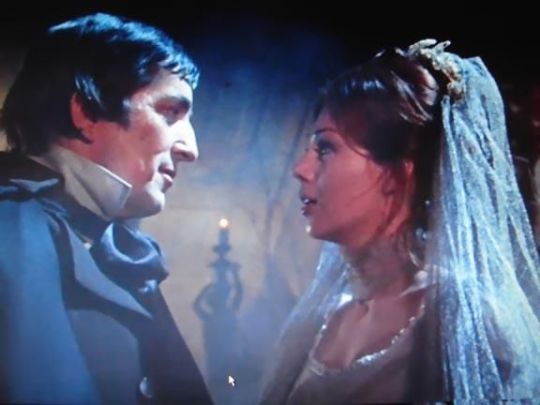
The show ran for over 1200+ episodes, and was a pop culture phenomena. By the end, Barnabas had firmly established himself as the main character of the series, and the Josette reincarnation plotline had been repeated several times. In 1974, two years after the series end, Curtis would go on to adapt Dracula into a television movie; he borrowed the reincarnated lover plotline from his own television show for that movie. Since then, it's become almost a trend in Dracula adaptations to follow this plot formula; sometimes with Lucy, but most often with Mina.
Not many people know about Dark Shadows these days, but the show had a huge cultural impact in the late 60's. Again, I'm not 100% able to say that every adaptation that features this trope is borrowing from Dark Shadows. Likewise, while a lot of the 'sympathetic vampire' or 'vampire as an affliction/disease rather than a creature of evil' may have have been inspired by something prior to Dark Shadows (Varney the Vampire is something to check out) it definitely helped to popularize the trope and bring it into the modern consciousness. (Sidenote; any adaptation that features 'curing' vampirism through medicine is, most likely, inspired by DS, but I'm not sure how common that one is)
So, uh, anyway! In conclusion if you're trying to mark out your bingo board of Dracula adaptations checking out a few episodes of the original Dark Shadows (NOT the tim burton one i cannot stress this enough) might be worth it. As an added bonus you get the world's most tortured pathetic Renfield-esque character, and a badass female doctor in the Van Helsing role. Thanks so much for asking and if you're reading Dracula for the first time I hope you enjoy it!!
#god thank you for asking this you're my new best friend i'm wiring 20 USD to your location rn#dark shadows#ds#dracula#dracula daily#barnabas collins#jonathan frid#ds 66#josette dupress#asks#goooddd im so long winded
87 notes
·
View notes
Note
you're really dedicated to making reylos look horrible. like maybe 60% of reylos are actually awful people right but you really just want to make it look like 100% of them are
Man, first off how fucking deep are you yanking these fucking numbers of your asshole because this is shit antis say. 60%? That's over fucking half. I've seen some pretty toxic fandoms, which reylo is most fucking certainty not fucking one of them, that have better numbers than that. Fuck the Star Wars fandom itself, you know the fandom that made the kid who played Anakin have to get therapy, the fandom that caused the man who played Jar Jar to consider killing himself, the fandom who made the actor who played adult Anakin quit fucking acting for a really long time, the fandom who made Gorge Lucas not want to make fucking star wars anymore, the fandom that made the actress who played Rey leave Instagram, and the fandom who made the actress who played Rose just leave the fucking internet entirely has a better statistic than that and there are actually nazis in that fandom, on top of all the shit I just listed which is hardly fucking everything this trash fandom has done. The worse I seen the Reylos do is get upset with John Boyega because he made comments about fucking his coworker and I'm pretty fucking sure Daisy Ridley, a married woman, wouldn't fucking appreciate that. Generally sexual comments are regarded as sexual harassment even if they're in tweet form. The reylos were more appalled that a man who is close to her and calls her a friend would say something like that. I don't make mean spirited sexual comments about my friends to goad people on twitter of all fucking places, that's fucking weird. Either way, what happened was fucking minor. John Boyega is still on twitter and fairly unaffected by the event. Daisy on the other hand was harassed off twitter and instagram by fanboys upset that a girl was the main character by sending her fucking death threats. These things are not the fucking same. If you fucking think they are you need to reevaluate your moral compass. What the ever-loving fuck is fucking wrong with you? But your shit morals aside: Mmm. But those reylos. Just thinking about how much they want to see the son of Leia Organa and Han Solo be redeemed and live a happy life for once is just enough to put any unsympathetic asshole's panties in a bunch. I'm being fucking sarcastic by the way. There is not a single fucking thing wrong with that mindset. What is a bad mindset is dedicating a large chunk of your life to hating what is essentially Space Beauty and the Beast because you can't emotionally comprehend a simple fucking redemption arc. No, I'm dedicated to telling anti assfucks to go fuck off and out of a tag they ain't got any fuckin business being in to fucking start with. I don't like Anime and wouldn't you fucking guess it? You'll catch me dead before you see me in the fucking anime tag being a useless twat to people in that fandom. Because I'm not a fucking twat. Well... I mean I am, but not to people who don't deserve it. Antis deserve it. Antis who come into my fandom space and actively harass me and my friends for enjoying a canon ship really fucking deserve it.
I don't fucking care what a anti thinks about me. I want antis to hate me, fuck they already do so what the fuck is a little more? I ain't winning you fucknuts over with honey any fucking day soon so baby it's time to get the Raid. I want every single anti who meets and fights with me to remember the fucking prick who told them to fuck off in such excruciating detail it would overfill a Jehovah's Witness pamphlet.
I want every single fucking anti asshole who comes into contact with me to remember the mean alligator reylo who told them they can kindly just pop their heads back into their shitty assholes where I can only assume their shitty opinion originate from and sonic roll out into low tide. I don't give a flying fuck and honestly at this fucking point I don't fucking care anymore. It's been 8 fucking years and if your opinion on reylo was this shit that long ago having one more telling you to kindly dick off isn't going to change your fucking mind. Oh no, one asshole thinks a reylo is an cunt, the same asshole who just told me statistically they already think over 60% of reylos are just fucking cunts so why the actual fucking Christmas Christ do you think I give a single solitary shit about you thinking I'm a cunt? Go ahead mate. I don't fucking care what you think. But you can close the door on your fucking way out and I hope it smacks you in the fuckin ass so hard it sends you flying out space never to be fucking seen again. Fucking Bye Felicia.
35 notes
·
View notes
Text
One thing I was thinking about tonight was how in chapter 133, I think, Levi says to the 104th, and the Warriors, that he’ll kill Zeke, but how he then says, “I’ll just need your help”, and how this really serves as kind of the perfect contrast between Levi and Eren. Levi is the strongest. He’s always been the strongest, more capable on his own of handling any sort of combat situation than anyone else. And yet, he knows when and is willing to ask for help from his comrades when he needs to, when he can’t handle a situation on his own. This stands out particularly in comparison to Eren, who was never very adept at fighting, or able to handle situations by himself, and yet it’s Eren who decides to spurn the help and aide of his friends and comrades and act alone, relying only on himself, a pattern that’s been present for him all his life, showing his childish immaturity and compulsive nature. It sort of demonstrates too the way in which Eren really failed to understand Levi and his lessons about making the choice you’ll regret the least, and what he said about never knowing whether it’s best to rely on yourself or your trusted comrades, but to choose whichever path you feel in your heart is right. It was never about knowing with certainty how to act to achieve the desired outcome, but accepting that no matter how strong you are, or how well laid your plans, the outcome is ultimately out of your control, and so the best you can do is make the choice you genuinely believe in at the time, and not regret it later, no matter the outcome. Essentially, accepting your limitations, and being okay with them. Levi accepts his limitations here in chapter 133, knowing he’s in too terrible a physical condition to get anything done on his own, and so he asks his comrades for help. I just think it’s really interesting, and really telling, that the character who’s the most capable and the most powerful in the story is able to ask for help when he needs it, and the character who’s own choices and actions continually have landed him and others in hot water, continues to act on his own and rely solely on himself, refusing to accept help, or even acknowledge that he needs it.
37 notes
·
View notes
Text
I think why hubert doesn't do it for me is that outside of the smug evil that falls off him like clouds, he comes across rather one note in a lot of other ways. Like, i wont deny that theres glimpses of something else there, but like so much in fodlan it just kinda sits there uncommented on or really observed in anyway.
longggg under the cut
To sorta point to a relatively striking comparison on the matter, the hxh character of shaiapouf shares a lot of similarities with hubert when it comes to the essential basics. they both pride themselves on being the smart planner of the servants, they're both unrepentantly evil and manipulative when it comes to achieving their goals, and they're both so intently devoted and loyal to a single individual as to stake their entire lifes purposes on making sure their liege is successful and prosperous.
but, aside from the surface level presentations being on opposite ends of the spectrum pouf putting on a show of refined elegance well hubert presents himself as the evil vizier, i think what helps elevate pouf over hubert for me is that pouf gets to experience a lot wider set of emotions and scenarios that help to very strongly define him on a very deliberate level by the narrative. one of the many thematic levers at play in hxh's chimera ant arc is commentary on loyalty, being loyal to a bad person, how loyalty can shift and change because of environment and circumstance, and importantly in poufs case how loyalty can mean different things for different people. pouf is the most fanatical of the chimera ant royal guard, but that fanaticism is to a highly idealized and glamourized ideal of the chimera ant king which causes him to act disloyal and pursue objectives contrary to the kings actual desires because pouf assumes he knows better and has absolute faith in that certainty. that certainty drives him to act in cruel and erratic manners as well if it means securing any advantage possible to achieve his idealized view of the king. its only after being psychically mind linked to the kings feelings does pouf breakdown and accept that the king has his own desires to pursue, dying not long after because of poison still desperately wanting to serve the king because of his inherent nature as a chimera ant royal guard. And thats the element thats missing from hubert really. not poufs exact storybeats mind, but more so that conflict of character with ideals and reality. As others have noted, huberts relation to edelgard is ridiculously one sided compared to other retainers in the game, even when you go down the romantic option for hubert and edelgard where her immediate assumption of huberts confession is that its a joke and their actual end crawl text together being remarkably cordial for people supposedly in love. Yet for someone who routinely goes out of his way to pick the murdery option to further his lieges goals, it never comes up as a point of contention between them that edelgard could give less of a shit about hubert putting so much of himself on the line to further her goals, or even just the implied tendency of the two to disagree on methodology. we dont get much of any insight into how much resentment hubert might be feeling about it all, the implied conflicts of methodology remain firmly in the background and deemphasized as much as the game can, and for a character so willing to go behind his lieges back to further what he thinks is best for them we never really get to see the twos relation thrown into any sort of conflict because of this. one or the other will grumble about the others actions, and then they just keep going regardless.
#fire emblem#hubert#its a shame cause i do wanna like hubert#but like so much of the BEs its all kinda 'head empty no thoughts' with em#that it just puts me off
10 notes
·
View notes
Note
So I have to ask, and you don't even have to go into detail, but was Bella rebounding with Marcus something you two actually saw as a good possibility or something you threw in for the Lolz? Because, the rest of what Alice said made sense, even Rosalie/Renata made a lot of sense when pointed out, but Bella/Marcus just came zipping out of left field to me. Either way, worth it for Bella's breakdown and all the intrusive thoughts she's gonna have in the future.
(Anon is referring to the last chapter of @theoriginalcarnivorousmuffin and I's cowritten fic For the Love of a Woman, in which Alice gets fed up with everyone and tells them exactly where their fateful decisions will lead them.
Also, apologies, this one has been in my drafts for a month for no other reason than I forgot about it.)
A good possibility, if not a certainty.
The Muffin and I were originally planning to write an epilogue for this story, but epilogues exist to wrap up the story. They have to fit in with the rest of it. As it was, the story wrapped itself up quite well with this argument chapter, with Edward, Esme, and Jacob's bickering serving as a good ending note.
Point being, we knew and had planned out what happens after the curtain falls.
In general, when writing fic - any fic - the Muffin and I ponder what's happening off-screen. Due to the limitations of the given narrator's point of view and creative decisions, not all of this makes it on screen. That doesn't mean the things other characters are up to off-stage doesn't influence the story. The reader might not hear the tree fall in the woods, but the characters do and it affects them. Our challenge as writers is to communicate this to the reader - the reader must be able to understand "Oh my, a tree must have fallen in the woods!"
There's been a lot of that in For the Love of a Woman, perhaps more so than usual in our fics. Jacob isn't in a position to know what Bella or the Cullens are thinking or doing when he's not around, they actively go out of their way to keep him out of their confidence, and his guesses are wrong more often than not.
As a result, the Muffin and I know exactly what's happening off screen, but Jacob wouldn't know about a lot of it and so we can't show it either. Bella's funeral is one example of this, as it was an absolute clusterfuck that we planned out and were going to write, only to realize that the boys would miss it and, more, it would be an entire chapter of essentially filler. It had to go, but lives on in the form of Esme blocking Edward and rapidly changing the subject when he tries to ask about the funeral. Carlisle and Bella discussing Bella's upcoming transformation is another example, Jacob and Edward fail to realize what they're hearing but the reader can read that conversation and draw their own conclusions.
Point being, we had it all planned out.
That's where Alice's vision comes in - we know what happens to the gang after the story ends, and were originally going to write an epilogue. However, the epilogue just... it didn't work. The story had an ending, it was neat and we liked it, and it felt much more organic and, frankly, on brand for the fic to have Alice say "You are all idiots and you're all going to have questionable love affairs. HAVE FUN WITH THAT."
TL;DR: why write an epilogue when Alice can spoil what would happen in it instead?
This is where the post would usually be over, but the Muffin or I are gonna have to explain Alice's vision and this might as well be the post
So you get a two-in-one.
Carlisle and Bella's ending
Over the course of the fic, Carlisle learned that he didn't have the kind, wise, and bright son he thought he had. Edward very much blew that to kingdom come. He's left wondering who Edward ever even was, and as it happens there is someone who can answer that question. This is his main reason for wanting to go to Volterra, showing that Bella is a vampire and confronting Aro about the Eclipse disaster is bonus reasons.
Well, he gets there, and he and Bella get the Edward Chronicles: Unfiltered.
With no family or home to return to in the outside world, and both him and Bella still recovering their footing in a world that isn't what they thought it was at all, he ends up staying for a while.
Bella, meanwhile, lost not just the love of her life in this shocking and incomprehensible way where she learned that she never knew him in the first place, but her best friend as well. The two people most important to her went mad, seemingly overnight. And then, as a bonus, she learns that Carlisle and Esme's marriage (which was the Cullen family bedrock) is a disaster, they fall apart, and next thing she knows Carlisle is sleeping with Aro.
To say nothing of the fact that all these men in her life that Bella took for granted were straight, turned out to very much not be.
Enter, then, a vampire whose gift is to see relationships. And who is too apathetic, too indifferent to this world, to pull any surprises or deceptions on her.
Ask Marcus "What's up with this guy?" and Marcus will tell you "Oedipus complex." without missing a beat.
Bella will seek out Marcus and, following the recipe if not the same series of events as Painting Red Madonnas, develop a close rapport with him. Given time, we have faith this utterly weird girl would find herself in an utterly weird bromance with the guy, that at some point down the line gives way to love.
Carlisle, meanwhile, finds that the technological advances of the human world mean that he can't simply jump right back into being a doctor. That door is closed.
Not to mention, there was a reason why he left Volterra in the first place. He wanted to find others, prove it wasn't just him out there -- and he found no one other, only the Denali, and the coven he made for himself has fallen apart. As it is, the one vegetarian left to him is already in Volterra.
As there is only the nomad life awaiting outside Volterra, and plenty of reasons to stay, Carlisle does not leave.
And Bella, well, Bella's vibing.
Rosalie and Emmett's ending
Rosalie and Emmett have the strongest relationship out of the Cullens, but that's not to say they'll be able to weather any storm. Living as just the two of them, indefinitely, soon unable to live among humans, will break them.
Within a few years they're forced to become full on nomads, and that's when the relationship starts deteriorating for real.
Without specific thought to how the breakup happens, it inevitably will. The Renata/Rosalie outcome hinges on Rosalie getting a lot of character development, though, as she learns not to need others or human rituals for the sake of validation or to feel like she's worth something. (But, that's probably a meta of its own. Or, god, might be it's been written, I can't even remember.)
Rosalie goes to Volterra to see Carlisle and Bella, the only people she has left now that she doesn't have Emmett any longer.
And then, well, she finds herself in Carlisle's shoes.
She could leave again, to be sure, leave and be a lone nomad.
Or she could stay, be with the scattered remnant of family she has left, and have a semblance of stability - of something more than lurking around in the woods. She'll be able to stay in touch, somewhat, with the world, if only through Aro's ever-expanding archive of human culture and history.
Rosalie stays.
We singled out Renata as the two women should be able to bond over monstrous men and what it means to be a woman in a man's world. Wouldn't happen in canon, mind you, but this is a Rosalie who has been through the kind of character development required to break up with Emmett.
Alice and Jasper's ending
He's dumped.
Alice stakes out a new path, wherever her visions take her. I imagine, for a while, she stays with the Denali. Could be a very long while.
Jasper loafs around for a while, at first with Peter and Charlotte, then eventually making his way to where Carlisle is, as the diet is unsustainable when in a coven of human drinkers, at least for Jasper.
#rosalie hale#emmett cullen#carlisle cullen#jasper hale#bella swan#marcus#aro#alice cullen#renata#twilight#twilight meta#twilight renaissance#writing#the carnivorous muffin#thecarnivorousmuffinmeta#for the love of a woman#my fic#fic spoilers
70 notes
·
View notes
Text
2021 MOVIES, #16

single all the way. this movie is so incredibly gay.
that’s really the only thing you need to know, the only part that mattered to me. it is christmas. it is gay. it is GAY CHRISTMAS. what more could i want?
i was sold on this one even without knowing it had jennifer coolidge and kathy najimy and barry bostwick and jennifer robertson. so many ties to queer culture! and again, the central (and only) romance in the movie is gay.
truly still stunned this exists in my lifetime. in a good way. but onto the actual review (this turned out surprisingly long as i picked apart its few flaws so i’m cutting it here lol):
friends to lovers tropey goodness, where the classic ‘city folk discover the joys of small town christmastime’ story plays out with a gay man whose family is obsessed with seeing him partnered up.
it was a little hard for me, a queer person estranged from her family of origin, to suspend my disbelief well enough to believe the main character’s decision to prioritize family time and his hometown. in that way, this movie is kind of the opposite of every found family narrative--the unfulfilled gay man improves his life not by building a family in his lonely city but by deciding to fit his dreams and love life back into the town and family he left.
the weird traditional bent of that, and the unanswered questions about his best friend/love interest, are probably the things that stood out for me less than awesomely. it’s made clear that his best friend misses having a family, and so is grateful to be included with the large one here...but his future partner seems oblivious to the pain that goes along with that. he thanks his friend constantly for ‘being there’ and ‘being him’ but never asks questions or offers support in return.
so, not to get too deep about a fluffy netflix christmas movie, but i’d worry about how that dynamic would play out in their future relationship. the best friend treats him as essential, going so far as to make his dream business possible--and the whole time he’s insisting that his life and work are adaptable, mobile, can totally adjust to what the main character wants. he deserves reciprocity.
when it comes to tiny quibbles about realism (though obviously i know these movies are not actually meant to be realistic) there’s also the part where we’re supposed to believe that these two best friends/roommates have no friend group or anyone else they would miss from their city lives after they completely relocate to a slower style of living?
speaking of which, the movie makes it clear that the area has very few queer people--but once the main character decides he misses his family, i guess that doesn’t matter outside of his romantic prospects? to me it seems weird that he doesn’t feel the need for any larger gay community, just his best friend and his very straight family to spend the rest of his life with. but okay.
and we’re supposed to not find it at all concerning that half of the couple will be a young black man moving to new hampshire where the only people he knows are his partner’s family, in a state that’s less than 2 percent black? i respect shows like schitts creek that decide to eliminate homophobia, but implying that the small town we see here is free of both homophobia AND racism feels like quite a lot to ask us to believe just because it’s christmas.
lol that’s not even touching on how far over the line his family take their meddling for the sake of pushing him toward the ‘right’ future. i was fully rooting for the two best friends to end up together, but by the time his nieces decided to ENDANGER HIS BEST FRIEND’S LIFE in order to blackmail him into a confession, with no interest in what either of the men truly wanted outside of their plan...part of me wanted him to end up with the other guy just to spite them! like, fuck your bullying and manipulation and certainty that your supposed-loved-one doesn’t have the right to make his own choices.
as a general plot point, that sort of thing doesn’t bother me in small doses, but i have never seen it be so obnoxiously over the top. Kind Dad barry bostwick was the only one trying to give them room to choose while also putting his opinion out there. i wish they could have all been like that.
with those caveats though, i loved the romance and the cast and the lead actors i had never met before. i will never forget jennifer coolidge’s pageant or how i never considered her to be perfect casting for kathy najimy’s sister but nothing makes more sense once you see it. i wanted more story for the best friend because he deserved to be more than just support during what was a hard time of year for him too, but it was nice to love him at all--i loved both the guys, and that can be rare for me with romcoms now. it was a great little christmas movie.
#2021 movies#single all the way#kathy najimy#barry bostwick#schitts creek#jennifer coolidge#long post
38 notes
·
View notes
Note
the thing i will never wrap my head around is introducing sylvie as a frankenloki & then giving her absolutely no depth despite her being the key protagonist of season 1... like mike must hate women for the fact that
1) all the tva women of color are sidelined immediately (at least the two w the most prominent & interesting roles/backgrounds) for a white ladies development
2) you can count all the tva lady agents we see onscreen w one hand
3) frankenloki aka sylvie has a bunch of gaps for a character like where’d she get blonde hair dye. if ure hellbent on revenge why are u making stops at wallmart 2 get a box of hair bleach. where’d she get asgardian leather but SPECIFICALLY for her top (she’s wearing baggy pants & combat boots w that ensemble??? which as i say it also sounds like those corny wattpad “put my hair in a messy bun, wore my combat boots” fanfic outfits 😭), why and how did she get the AoA loki horns, she didn’t have them when she was taken. if she hates the loki association why’s she wearing the horns & the color green which is... the biggest target to be perceived as loki
4) if she’s an important part of the self love metaphor romance why does she always make this face “😐🤨🤢😐🤨😐” when loki talks (berating him & betraying him in the end aside ofc!)
5) why do we not know her nexus event? why do we not know why she chose the name sylvie? why does she have no prominent character traits outside of having a vagina? why is she cis? why did she get taken at the tender age of an elementary schooler but not when she was born if her crime was being born a girl?
6) has mike waldron ever met, spoken to, or seen a woman? has he engaged in critical, intelligent conversation with anyone, really?
7) can i be emotionally compensated by disney for simultaneously the most BORING (how do you make.. the god of mischief & tricks... boring is beyond me) and convoluted overstuffed show for wasting my time?
I don't know that Mike hates women, but I do think, based on his interviews and the resulting product he made, that:
1) It was certainly a choice to make the two prominent black female characters slaves to a fascist organization and one essentially a leader of it. A choice I don't think anyone involved in creating this show spent a second to think about.
I don't think they were necessarily sidelined on purpose, however. I just think it's an inevitable by-product of the show's terrible pacing and even worse writing. That scene one between B-15 and Renslayer, a scene I think was ultimately a waste of time, made me think that they probably did want to highlight at least those two characters on their own merit. They failed, of course, in the end, and with the set-up I think the intention or lack of intention doesn't really matter since we get what we get, you know?
It's not really a shinning example of giving your characters of color time and care, either, but I do have to highlight B-15's moment of doubt, a scene I think Wunmi Mosaku absolutely killed (seriously, everyone needs to check out her other work, she is effort and talent personified.).
Besides that, if you ask me, no character in this show has any real development anyway, including Sylvie. It is an uneven display of screen-time because obviously she's a main over everyone else but, like, can it even be said that Sylvie particularly benefited from it? I don't really think so. As you said, she has no depth, she is just an empty girlboss fantasy, and the diversity in general in this show feels empty to me.
2) I didn't really even want more TVA foot soldiers to be women. It wouldn't be a diversity win so much as just more empty pandering and Marvel's typical (military) propaganda fuel.
Anyway, I'd like to highlight some youtube creators of color who make great in-depth videos on this issue:
Khadija Mbowe: Color-blind vs. Identity-conscious casting and examining Hamilton and Malcom & Marie
Town of Tawiah: Performative Diversity and Colorism in Film | Dear White People Review, My Wife & Kids,HTGAWM & More
Cheyenne Lin: GOOD Representation Matters | Colorism and Casting
There's obviously way more, but these videos are a good starting point to expand on this topic from people who know what they're talking about. I put a link to their videos while the link on their names will lead you to their respective channels.
3) Sylvie's whole appearance is bullshit from the get-go. They deliberately used comic book references on her to confuse us and make their dumbshit twist of: oh, see, she actually is a Loki variant!
I remember seeing a post essentially saying whoever thinks Sylvie is a Loki variant with 100% certainty is media illiterate lmao, so I guess it worked on some people.
So, you know, IMO, it doesn't matter that it doesn't make sense for her to wear Loki's signature colors and the iconic AoA head-wear, she just does because fuck you.
Also, "if ure hellbent on revenge why are u making stops at wallmart 2 get a box of hair bleach." lmaooo - she just wanted to be her own person, you know, visually, but only with her hair and nothing else :)
4) Sylvie so very clearly doesn't even like Loki all that much, certainly not as much as he likes her (she is a girlboss after all, "she's got shit to do!"). It would be funny if it wasn't tragic. I do feel bad for Larry from accounting :(
5) I'm guessing we don't know her nexus event because they kinda never bothered to define what it was and they don't care. Maybe Renslayer saying she doesn't remember her nexus event was supposed to be this moment of like cold truth, or an attempt to hurt Sylvie because she knows but won't tell her, or, you know... actually, who cares.
6) I think Mike has spoken to women and I think he's had plenty of intelligent and critical conversations at his level. Which is a relative zero to a generous one. Perhaps two on a good day.
Idk though, jokes aside, his writing on this series is childish and lazy, his view of Loki is boring and reductive, his original script he used for this show is absolute shit, and that's all I can really say for sure.
7) I wish. The show really is boring when it isn't actively infuriating. It still boggles my mind how this mess even happened. Like, I knew the show would be bad, but this bad? Man oh man.
82 notes
·
View notes
Text
Finding ChristBorg: A TED talk about what happened during the Coldharbour Compact.
Reposted from my tes reddit bc I want to see what y’all think.
I can't tell if I'm a genius, completely insane, or if I'm just late to the lore-party. Time to find out I guess. TL;DR at the bottom.
So it has never been explained what Sotha Sil did during the Coldharbour Compact to convince the daedric princes to not manifest on Nirn without an intermediary, and it probably never will be since the mystery of it all is far too cool. But that doesn't mean I can't read into it like literature and look for meaning in the other texts I can compare it to.
To start, Vivec is based off of the Shakta variation of the half female/half male Ardhanarishvara, where the gold-skinned female half is the right side. Both Vivec and Ardhanarishvara represent unity and duality, and looking at some images of Ardhanarishvara, it's kinda hard to argue that Vivec wasn't based off of them. Kirkbride even confirmed that Ardhanarishvara was the inspiration for Vivec in an AMA. Now, Vivec is part of the god trio the Almsivi Tribunal, along with Almalexia and Sotha Sil. Shiva, who Ardhanarishvara is the avatar of, is also part of a god trio, called the Trimurti in Hinduism. So it would make sense if the other members of the tribunal are also based off of one member of a real world religious triad. I have a shaky idea of who Almalexia could be, but my theory for her god-inspiration is nowhere near as solid as my theory for Sotha Sil, who I believe is based on Jesus Christ.
To start, their characterizations have multiple similarities. Both are one branch of a god-triad, with Sotha Sil as part of the Tribunal, and Jesus as The Son in the Holy Trinity. Both serve as a teacher, with Jesus being referred to as Teacher several times in the Bible, and Sotha Sil giving lessons on magic and Mysticism to the Psijic Monks. Also, both are characterized as wise, patient, and celibate. They both talk about moral and philosophical concepts with their followers, neither Jesus nor Sotha Sil are shown as having a temper or raising their voices, and neither of them are shown with a spouse or partner. Sotha Sil is specifically shown as not caring about the Night Mother's attempts to sexually manipulate him in book seven of 2920, The Last Year of the First Era. Now I know that 2920 is considered a work of historical fiction in-universe, but I don't think that matters in this situation since I'm approaching this as a person reading a text, not as a person living inside the lore world.
In terms of specific scenes that connect Sotha Sil and Jesus, the first I will mention is that they both use a makeshift whip to beat intruding wrongdoers and drive them away, while yelling about fathers. In the Truth in Sequence vol. 8 book, it says that "[t]hrough His will alone, Mighty Seht wound the veins (of metal ore) into god-bronze whips, and lashed the Prince pitilessly," saying "[b]ehold the wrath of lost Ald Sotha! Know death at my hands, false-son of a false-father!" In the Bible, Jesus found people doing sales in a place of worship, and then He "made a whip of cords, (and) He drove them all out of the temple," saying “Take these things away! Do not make My Father’s house a house of merchandise!” (John 2 15-16).
Also, Jesus had close friends and followers who were called his apostles, and Sotha Sil has his own Clockwork Apostles. Sil's apostles reside in the Clockwork Basilica, and while basilica isn't an exclusively Christian term, it is frequently used to describe a type of church architecture, and is a term the pope uses to recognize distinguished churches.
Another similarity that I found was in the plot of Morrowind, where Sotha Sil's death was caused at the hands of Almalexia, who was someone he had once loved and trusted, much like with Jesus and Judas.
The most notable life similarity as it relates to the Coldharbour Compact is that both leave the earthly world in order to make a deal for the benefit of the souls on earth, and then return to the earthly world. This parallel is given extra weight with the descriptions of the scene in the book 2920, The Last Year of the First Era. Sotha Sil returns from Coldharbour by way of someone "rolling aside the great boulder that blocked the entrance to the Dreaming Cavern. This sounds a lot like the scene in the bible of the discovery that Jesus had risen from the dead, where "an angel of the Lord descended from heaven, and came and rolled back the stone from the door" (Matthew 28:2). In addition, Jesus said "after He is killed, He will rise [on] the third day," (Matthew 17:23) and after Sotha Sil returned from Coldharbour, he "felt he had been away for months, years, but only a few days had transpired." Perhaps it had been 3?
In addition to the life and behavior similarities, there are similarities in dress. In the 2920 book, Sotha Sil is always described as wearing a white robe or cloak. In ESO, Sotha Sil is shown as barefoot, and wearing a blue sash over his long white robe. In medieval and renaissance art, Jesus is most always depicted as barefoot, and is frequently shown with a blue cloth over his shoulder. In most resurrection art, as well as in almost all 20th/21st century art, Jesus is depicted as dressed in white. While Jesus usually isn't usually shown wearing both the blue sash and the white robe at once like Sotha Sil is, I found one modern interpretation of Jesus that does dress him this way, and several depictions of him in Chinese art that also portray him like this.
I'm feeling almost conspiratorial here, but these similarities are far too many for me to think it's accidental, and therefore I have to think that all of this is meant to suggest that Sotha Sil serves a Christ-figure role in his story, i.e. in sacrificing own life like Jesus did in order to make his deal in the Coldharbour Compact. However I don't think Sil's sacrifice was quite so simple. After he is asked what he offered the Daedra in return for the deal, he states: "The deals we make with Daedra... [s]hould not be discussed with the innocent." This implies that in contrast to the Christ mythos, Sil's sacrifice was not blameless; he did not come out of the deal with his hands clean.
So, a Christ-like sacrifice that isn't quite as pure and selfless as it is in Christianity. What could that be?
My theory is that in order to make the Coldharbour Compact, he sold the lives of Vivec and Almalexia along with his own. Perhaps he told the princes that he knew the tribunal's godhood would end, and in exchange for their cooperation he promised not to tell the other tribunes or make any attempt to prevent his and his companions' demise. (After all, as far as I know he made the mechanical heart for keeping his city functional, not for recreating the divinity the heart of Lorkhan provided.) Or, maybe he offered to do something to assist in bringing the Tribunal down, and losing Sunder and Keening, the tools that helped them maintain their divinity, was intentional on his part. Sil deliberately sacrificing his own life appears to be reflected in Azura's statement after his death. She said "he shed his mortality long ago, and I am certain his death was no small relief to him." Of course she'd know that he let go of his life ages ago if he had willingly sold it to her. Of course she would be certain that he found his death to be a relief, if she'd heard him say so himself when he was explaining why a god would ever offer such a deal.
It would also make sense with Sotha Sil's character, since he allegedly loved the people on Nirn more than Almalexia or Vivec did, and the destruction of Gilverdale could have definitely been a traumatic enough reminder of the destruction of Ald Sotha for him to do something dramatic to prevent it ever happening again. And guilt over sacrificing his friends could have definitely been a contributing factor to the worsening self-isolation and intense depression in his later life. It would also be a definite explanation for why he apparently never met another soul in the 10 years between losing the tools and his death. Not only had he become extremely disillusioned with the imperfections of the world, he had now finalized the deal he made so long ago, and saw no point in continuing to interact with a deeply flawed world he was essentially finished with.
However, I do see some issues with this and how it would work in-universe. Namely the fact that Hermaeus Mora's seekers said the prince received something from every individual on Nirn as part of the deal, which is quite different from what I'm suggesting. A different deal for each prince would also explain why Sil was able to include Clavicus Vile and Mephala in the compact at a much later date. There would be no reason for Vile and Mephala to submit to a collective deal whose terms had already been decided. So if he offered the tribunal's lives as part of the deal, he would have needed to offer other things as well. But for me the most significant in-universe issue I struggled with was that using his death as a bargaining tool would create a massive problem for his ability to enforce the deal in the future. This could explain why both Molag Bal and Mehrunes Dagon manifested on Nirn after Sotha Sil's death, but since I think they were summoned by qualified mortals that could have been a loophole. Either way, making a deal that is meant to last forever by promising something that can never be taken back in the case of a breach of contract seems extremely short-sighted for someone who claims to be cursed with certainty. Especially considering how many of the princes there were known to be cheats and liars.
Unless, that is, you believe this theory I read about the reason why Sil was completely silent as he was killed. My original belief was that he was silent because he'd seen it coming long ago, and knew that nothing he could have said would have changed Almalexia's mind. And while that would be in character for him, now I'm starting to think that it was because he had already uploaded his consciousness elsewhere. This would fit in with the Christ-figure parallels, due to the Christian belief that Jesus is risen from the dead and very much alive. While Jesus returned to life at the same time he emerged from the cave, the completion of Sotha Sil's death sacrifice didn't happen until long after his return via the cave. While I have found no explicit evidence that he's still around, when you find his body in Morrowind he is shown hanging, with his arms outstretched at his sides, in a sort of crucifixion pose. And after the crucifixion comes the resurrection. Perhaps Sotha Sil is still around somewhere in the gears of his city, and he promised the princes he'd never be present or have any influence on Nirn so long as they kept up their end of the deal. Additionally, the 37th sermon of Vivec mentions Sotha Sil as holding "his swollen belly," carrying "[his] daughter." While Vivec's sermons are hardly ever literal, Kirkbride's comments suggest that maybe Vivec was being somewhat literal in this instance. Regarding this concept art, Kirkbride said "note the cosmic baby growing inside Sotha Sil. While Sotha Sil is dead as we saw in the add-on pack “Tribunal”, the child survived." Perhaps one of Sotha Sil's many body modifications made him able to carry and birth a child, and then he created a daughter through self-cloning or some other method that allows him to have enough influence to enforce the compact.
TL;DR - Sotha Sil has a lot of similarities with Jesus, so he's a Christ figure and therefore his sacrifice in the Coldharbour Compact was himself, and Almalexia and Vivec too, and that also means that he may still be around.
Anyways, thanks for reading and sorry if this sounds like I'm putting red strings on a wall as my application essay to the r/SothaSimps fan club. Also, lmk if I'm missing anything obvious. For me right now Reading Lore On The Bedroom Floor is a bit more manageable than playing the games, and there may be something I've just completely looked over.
#sotha sil#tes#the elder scrolls#tesblr#vivec#almalexia#morrowind#elder scrolls online#eso#lord seht
58 notes
·
View notes
Text
the old guard and moral uncertainty
One of the things I love the most about The Old Guard, which I haven’t seen discussed much, is that there is no why to their powers. There’s no origin story, either via destiny or accident. There’s no prophecy, no curse, no ancient god, no super-serum, no lab accident, no mutant spider bite. If there is a reason why these people, in particular, are like this, we don’t know it and they don’t either. Where their immortality comes from, and why it fades when it does, is a complete unknown.
In other contexts I could see this coming off as a frustrating lack of clarity in worldbuilding. In The Old Guard I think it works as an essential piece of the philosophical landscape in which the story operates.
A parallel and interlocking component of this landscape is the fact that the immortals exist in a world where there are very few, if any, other superpowered beings. There are no pre-ordained forces of darkness, no aliens to fight, no neatly-arranged supervillains that only they can defeat. There are only humans.
This means they have to create their own framework of meaning for their actions, the way the rest of us mortals do. The mythology of their world doesn’t provide any built-in delineation of good guys and bad guys and What We’re Fighting For. There’s no easy certainty of purpose or moral clarity to be had.
I think there is a distinction to be drawn out here between moral uncertainty and moral ambiguity. Because there are certainly plenty of superhero stories, and stories about violent characters in general, that engage with morally gray choices and anti-heroic behavior. But these problems are more commonly considered along the vector of ends and means. “Are these questionable means justified by this end, which I believe is good? Is there a point at which violent means make this good end I believe I am pursuing moot?” (It’s interesting that the characters in The Old Guard who engage in this more expected sort of ends-and-means reckoning are the antagonists.)
For the protagonists, the question lingers much more in the place of: “What even is our end? How do we know it’s good?” Not just, “Are we being effective as a handful of immortals against all that is wrong with the world?” although that question is there. But “How do we know we are doing the right thing at all?” The narrative provides no definitive answer to this question.
“Are you good guys or bad guys?” Nile asks.
Joe’s answer--“Depends on the century”--I think is not just meant to imply that they have been on many sides of many different conflicts, but that sorting out the good guys from the bad guys is malleable and historically contested.
“We fight for what we think is right,” Nicky says, in the same conversation where he talks about how the love of his life was someone he was taught to hate, someone who I’m sure he felt right about killing the first time around.
Andy, notably, says nothing in response to this question.
Even Copley’s I’ve-connected-the-dots board is not as satisfying as it may appear at first. For every prize-winning scientist whose fate they affected, there must have been countless ordinary civilians whose lives never dented the historic record. Was saving them any less meaningful? For every future humanitarian and peacemaker protected, how many conscripted soldiers met the business end of a labrys? What might any one of them have contributed to the world if they had survived? And how does one possibly weigh all these considerations in the moment when someone’s life is on the line? No one can, not even an immortal.
It is perhaps appropriate that the film’s clearest moral statement is articulated not in a grand pronouncement before a battle charge, but by a background character, a mortal with a handful of lines, in the back room of a pharmacy. “You need help. What does it matter why? Today, I put this on your wound. Tomorrow, you help someone up when they fall. We’re not meant to be alone.”
The final sentence of that statement isn’t an accident. Running parallel to the more philosophical musings on moral uncertainty in the text is a constant focus on the value of human connection as the thing that keeps you alive, and sane, when an easy way to make sense of the world is not on offer. It’s significant that the thing that convinces Andy that life is still worth living is not a mission, but a person. And while the scene with Copley’s research boards may be the moment that attempts to explain what the movie is saying philosophically, the emotional climax is the whole team, and in the final moments just Nile and Andy, protecting each other over and over again.
All of this adds up to a thesis statement that’s considerably more nuanced and humanist than one might expect from this genre. Protect the people you love. Give help when it’s needed. Try to do what’s right, but have humility about whether you actually know what that is.
Walking along the precipice of uncertainty without tipping over into grimdark cynicism and despair is an extremely challenging balancing act to pull off, and The Old Guard absolutely smashes it.
1K notes
·
View notes